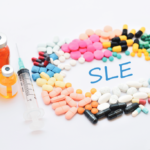Noting that atacicept may be a potent immunosuppressant and some serious infections and deaths have been reported in the past, Dr. Merrill emphasizes the current study guarded against the risk for serious infections by requiring all patients be up to date on their vaccinations. “Also, blood tests for levels of protective antibodies (immunoglobulins) were followed to mitigate the risk for infection during the study,” she says. Serious infections occurred in 1% of patients treated with atacicept 150 mg, 5.9% at 75 mg, and 5.0% with placebo. There were no deaths in this study.
Benefits
In exploratory analyses assessing SRI-4 in subgroups of patients, the study found a significant benefit with atacicept in patients with more clinically and serologically active disease.
Patients with serologically active disease treated with atacicept 75 mg and 150 mg had significantly higher SRI-4 response rates than placebo at 24 weeks (62.1% and 61.5%, respectively, vs. 24.1%; P=0.002). In addition, the study found significantly higher SRI-4 and SRI-6 response rates at 24 weeks in patients with high levels of clinical disease activity treated with atacicept 150 mg compared with placebo (62.7% vs. 42.3%; P=0.029).
Commenting on the study, Zahi Touma, MD, clinician-scientist and assistant professor at the University of Toronto, Toronto Lupus Clinic, Ontario, Canada, notes this is not the first trial to show the treatment effect size of a drug being evaluated (e.g., atacicept), compared with placebo, is larger in patients with more clinically active disease. Given that, “we should be more selective in lupus trials by mandating the severity level for disease activity,” he says.

Dr. Touma
Dr. Touma suggests mandating that patients enrolled in a clinical trial have active arthritis in six joints at baseline rather than two or more as defined by the Systemic Lupus Erythematosus Disease Activity Index 2000 (SELDAI-2K).
The study also found a significant reduction in severe disease flares with atacicept at both doses compared with placebo (hazard ratio of 0.18, 95% CI 0.05-0.62; P=0.002). This was particularly seen in patients with high disease activity.
All things considered, Dr. Merrill says the findings “suggest that atacicept may have value for lupus patients and provide support for continued study of the treatment.”
Dr. Touma agrees. “Despite this negative trial, I still think atacicept is a promising drug that requires further evaluation in phase 3 trials,” he says, adding that the success of future trials can be enhanced by accounting for the most common SLE-related obstacles in clinical trials, such as the lack of stringent discriminatory outcome measures, inadequate sample size and endpoints, excessive background therapy (glucocorticoids in particular) and the heterogenous nature of the sample population.

